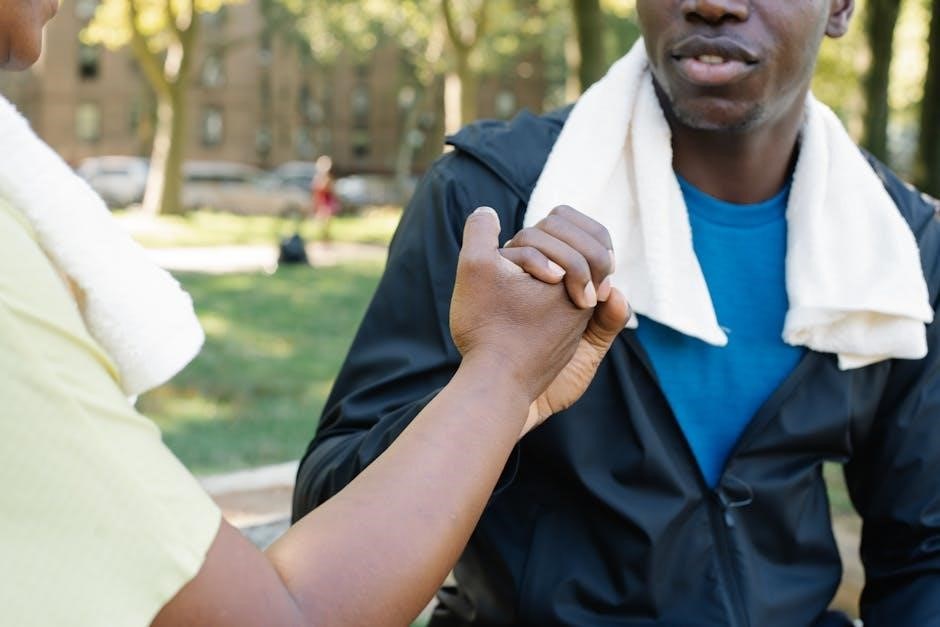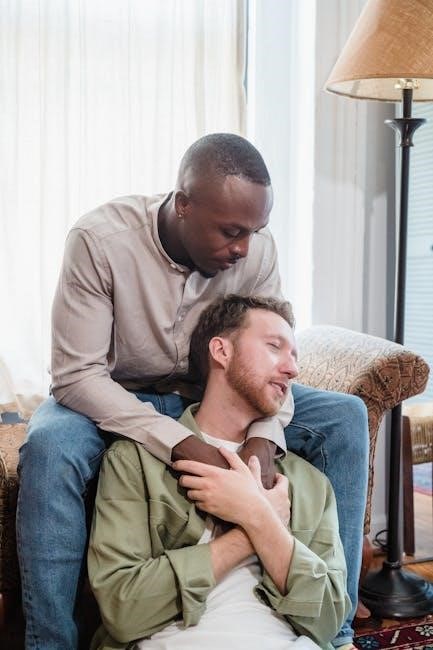black man’s guide to understanding the blackwoman pdf

black man’s guide to understanding the blackwoman pdf
This book, written by Shahrazad Ali in 1989, explores the dynamics between Black men and women, offering insights into cultural, historical, and societal influences on their relationships.
Overview of the Book and Its Purpose
Written by Shahrazad Ali in 1989, The Black Man’s Guide to Understanding the Black Woman aims to foster greater understanding and harmony between Black men and women. The book delves into historical, cultural, and societal factors that have shaped relationships within the Black community. It critiques harmful dynamics and encourages introspection, mutual respect, and growth. The text has sparked both controversy and dialogue, serving as a provocative exploration of Black relational dynamics and their potential for healing.
Importance of Mutual Understanding in Relationships

Mutual understanding is crucial for fostering healthy and resilient relationships between Black men and women. By addressing historical wounds and societal pressures, the book emphasizes the need for open communication and empathy. Understanding each other’s experiences and perspectives helps bridge divides, fostering respect and unity; This foundation of comprehension is essential for overcoming challenges and building stronger, more fulfilling partnerships within the Black community.
Historical Context of Black Relationships
The legacy of slavery, systemic racism, and cultural displacement has deeply shaped Black relationships, creating historical wounds that continue to influence dynamics and perceptions today.
The Impact of Slavery and Systemic Racism
Slavery and systemic racism have left deep scars, fostering mistrust and emotional distancing between Black men and women. Historical trauma disrupted familial structures, reinforcing harmful stereotypes and power imbalances. These legacies continue to affect communication, intimacy, and mutual respect, making understanding and healing essential for rebuilding strong, healthy relationships.
Cultural Differences and Their Effects on Relationships
Cultural differences often stem from societal expectations and upbringing, influencing how Black men and women perceive roles and responsibilities. Traditional gender norms, communication styles, and emotional expressions can vary, leading to misunderstandings. These differences highlight the need for open dialogue and mutual understanding to bridge gaps and foster stronger, more harmonious relationships.
Cultural Aspects of Black Women
Black women’s cultural identity is rooted in resilience, rich heritage, and community ties, shaping their perspectives and expectations in relationships and societal interactions.
Traditions, Values, and Expectations

Black women’s cultural identity is deeply rooted in traditions that emphasize resilience, family, and community. Values such as strength, loyalty, and independence are often upheld, shaping their expectations in relationships. These expectations stem from historical and societal experiences, influencing how they navigate partnerships and interactions. Understanding these cultural pillars is crucial for fostering mutual respect and alignment in relationships, as highlighted in the guide.
The Role of Identity and Self-Perception
Black women’s identity and self-perception are shaped by a blend of cultural heritage and societal narratives. The guide emphasizes the importance of self-awareness and how internalized stereotypes can impact relationships. Understanding their identity helps Black men appreciate their partners’ strengths and challenges, fostering deeper connections and mutual growth. This awareness is key to building harmonious and respectful partnerships.

Psychological and Emotional Dimensions
The book delves into understanding the emotional complexities of Black women, emphasizing empathy and open communication to foster healthier, more supportive relationships.

Understanding Emotional Needs and Expressions
The book emphasizes the importance of recognizing and validating the emotional experiences of Black women, shaped by societal pressures and historical trauma. It encourages Black men to actively listen, empathize, and acknowledge the unique challenges Black women face, fostering deeper emotional connections. By understanding these dynamics, relationships can become more supportive and nurturing, bridging gaps caused by misunderstandings or unmet emotional needs.
Communication Styles and Conflict Resolution
The book highlights the significance of understanding communication styles and conflict resolution strategies to strengthen relationships. It encourages open dialogue, active listening, and empathy to bridge gaps. By addressing misunderstandings and fostering mutual respect, Black men and women can navigate disagreements constructively. Effective communication is key to resolving conflicts and building trust, ensuring relationships grow stronger through shared understanding and cooperation.

Societal Narratives and Stereotypes
Societal narratives often portray Black women through stereotypes, such as being aggressive or overly independent. Media representation and cultural biases fuel these misconceptions, impacting relationships and self-perception.
Common Misconceptions About Black Women
Common misconceptions about Black women often stem from societal narratives and stereotypes, such as being perceived as aggressive, bitter, or overly independent. These labels frequently emerge from historical and cultural biases, as well as media portrayal. Such misconceptions can lead to misunderstandings and emotional barriers in relationships, reinforcing harmful stereotypes that Black women continually navigate and challenge in their daily lives and interactions.
Media Representation and Its Influence
Media often portrays Black women through limited, stereotypical lenses, such as the “angry Black woman” or the “strong Black woman,” reducing their complexity. These narratives shape societal perceptions, influencing how Black men view Black women and vice versa. Such portrayals can perpetuate misunderstandings and reinforce unrealistic expectations, highlighting the need to move beyond mediated stereotypes and embrace authentic understanding and respect in relationships.
Personal Growth and Development
The book emphasizes self-reflection and empowerment, urging Black men to introspect on their behaviors and attitudes toward Black women to foster healthier, more respectful relationships.
Self-Reflection for Black Men
The book encourages Black men to engage in introspection, examining their attitudes and behaviors toward Black women. It emphasizes understanding historical and societal impacts on relationships. By fostering self-awareness, men can address biases and stereotypes, promoting mutual respect. The guide offers practical advice for personal growth, urging men to take accountability for their actions. This reflection aims to strengthen connections and build healthier, more empathetic partnerships, aligning with themes of empowerment and unity.

Empowerment and Mutual Respect
The book highlights the importance of empowerment and mutual respect in fostering healthy relationships. By understanding and valuing each other’s experiences, Black men and women can build partnerships rooted in equality. Empowerment involves recognizing each other’s strengths and supporting personal and collective growth. Mutual respect fosters trust, communication, and unity, enabling both partners to thrive. This approach strengthens relationships and contributes to the broader empowerment of the Black community.

Trust and Loyalty in Relationships
Trust and loyalty are cornerstones of lasting relationships, emphasizing commitment and fidelity. Open communication and mutual respect help build and maintain these vital elements, fostering deeper connections and unity between partners.
Building and Maintaining Trust

Building trust requires consistent actions, transparency, and emotional availability. Open communication fosters understanding, while empathy and accountability strengthen bonds. Mutual respect and reliability are key to sustaining trust, creating a foundation for lasting relationships. Both partners must actively work to nurture trust, addressing conflicts with honesty and commitment. This shared effort cultivates a secure and supportive partnership, essential for overcoming challenges and fostering unity.
Overcoming Distrust and Betrayal
Overcoming distrust and betrayal requires acknowledgment of past wounds and a commitment to healing. Open dialogue, accountability, and empathy are essential. Both partners must address root causes of mistrust, fostering a safe space for vulnerability. Rebuilding trust involves consistent actions, transparency, and a willingness to grow together. Mutual effort and patience are crucial in mending relationships and creating a stronger, resilient bond.
Modern Challenges and Solutions
Modern challenges include societal narratives and media influence affecting relationships. Solutions involve fostering open communication, mutual respect, and empathy to build stronger, healthier partnerships in contemporary settings.
Navigating Contemporary Relationship Dynamics
Contemporary Black relationships face challenges like societal narratives and media stereotypes. Open dialogue, mutual respect, and empathy are essential. Understanding each other’s perspectives fosters healthier partnerships, addressing trust issues and communication gaps. The book guides readers to navigate these dynamics by promoting self-awareness and emotional intelligence, helping to build stronger, more fulfilling relationships in today’s complex world.
Creating Healthy and Fulfilling Partnerships

Creating healthy partnerships requires mutual effort, trust, and open communication. Both individuals must prioritize understanding and respect, fostering an environment of emotional support. By addressing past hurts and embracing shared values, couples can build a foundation of loyalty and empathy. This approach encourages personal growth and strengthens the bond between Black men and women, leading to more harmonious and fulfilling relationships.
The book provides a thought-provoking exploration of Black relationships, emphasizing mutual understanding and respect. It encourages reflection, growth, and unity, fostering healthier connections for the future.
Summarizing Key Takeaways
The book emphasizes understanding historical and cultural impacts on Black relationships, fostering mutual respect, and addressing societal stereotypes. It highlights the importance of trust, communication, and empathy, encouraging growth and unity. Readers gain insights into navigating challenges and building stronger, healthier partnerships rooted in respect and shared understanding.
Encouragement for Continued Learning and Growth
The book inspires Black men and women to embrace lifelong learning, fostering healthier relationships through empathy and understanding. It encourages open dialogue, self-reflection, and challenging stereotypes. By addressing historical and cultural influences, readers can grow individually and collectively, building stronger connections. This journey of discovery promotes unity, respect, and a deeper appreciation for the shared experiences of Black men and women in their communities.